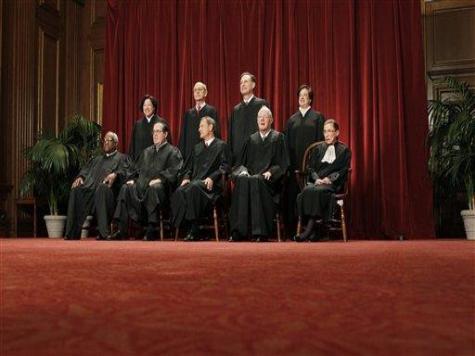
FCC fines imposed on two broadcast networks were set aside by the Supreme Court last week as unconstitutional. This case of FCC v. Fox Television was a free speech challenge to a federal indecency law, but the Court caught the country by surprise, holding that these fines were a Fifth Amendment due process violation, and will wait until a future day to decide the First Amendment issue.
Four incidents led to this decision. First, during the 2002 Billboard Music Awards on Fox, Cher showcased her good manners and maturity by dropping the F-bomb on national television while children were watching. Not to be outdone, during the following year’s broadcast Nicole Richie reminded us of what a spoiled childhood leads to when she demonstrated an equal lack of maturity and civility by injecting the S-word into her remarks. Then there was a rear-view naked shower scene on NYPD Blue on ABC. Finally during the Golden Globes that same year, the iconic Bono dropped yet another F-bomb.
Enough was enough. Although cable television and satellite radio are not subject to federal control, public broadcast channels for television and radio are licensed by the government and held for the public trust and benefit. (At least that’s the theory.) The Federal Communications Commission (FCC)–specifically empowered by federal statute to prohibit indecent content on the public airwaves–issued guidelines after the Golden Globes incident informing all broadcasters that even a single instance of indecent content could be fined.
This was the latest step in an ongoing struggle to push back against the coarsening of society by seeking a balance of free speech while protecting venues filled with children in a manner acceptable to the First Amendment. In 1978, shock-jock George Carlin deliberately delivered a monologue overloaded with profanity and sexual references to make his wooden-headed argument that the Supreme Law of the Land was designed to protect his ability to say such things on family shows when children are known to be listening.
When the FCC acted against the broadcaster, it went to court. In its 1978 case FCC v. Pacifica Foundation, a fractured Supreme Court–with no majority holding as to why–held that the First Amendment permits government to regulate indecency on the public airwaves. This is not obscenity, which is defined as content of a profane or sexual nature that has no redeeming social value and is intended only to appeal to prurient (i.e., unwholesome) interests. The Free Speech Clause was intended to allow the unfettered exchange of ideas of public interest without government censorship in order to effect political and social change, often criticizing government in the process. The Court has always correctly held that obscene material enjoys no First Amendment protection.
Indecent material is vulgar or sexual content that does not rise to the level of obscenity. After Pacifica, the FCC later announced in 1986 that it would act against deliberate or repeated indecencies, but did not address “fleeting expletives” or brief nudity. The 2003 Golden Globes order clarified its policy that it could act on such isolated incidents.
FCC then fined Fox and ABC. After two rounds of litigation, it went to the Supreme Court on First Amendment grounds. A unanimous Court set aside the FCC’s order, with Justice Sonia Sotomayor recused from the case because this matter was before the Second Circuit appeals court while she was still a judge there.
Justice Anthony Kennedy began his majority opinion for seven justices, “A fundamental principle in our legal system is that laws which regulate persons or entities must give fair notice of conduct that is forbidden or required.” This is part of the Constitution’s guarantee of not depriving anyone of life, liberty, or property without due process of law.
Kennedy continued, “This requirement of clarity in regulation is essential to the protections provided by the Due Process Clause of the Fifth Amendment… It requires the invalidation of laws that are impermissibly vague.” The void-for-vagueness doctrine renders a law unconstitutional if it “fails to provide a person of ordinary intelligence fair notice of what is prohibited, or is so standardless that it authorizes or encourages seriously discriminatory enforcement.”
Applying that standard here, the Court found back in 2003 the FCC “failed to give Fox or ABC fair notice prior to the broadcasts in question that fleeting expletives and momentary nudity could be found actionably indecent. Therefore the Commission’s standards as applied to these broadcasts were vague, and the Commission’s orders must be set aside.”
Justice Ruth Bader Ginsburg–former chief lawyer for the ACLU–wrote an opinion concurring in the Court’s judgment, but writing that the Court should strike down this federal law as a violation of the First Amendment and overrule Pacifica, as the top-tier lawyers for Fox and ABC (led by heavyweights Carter Phillips and Miguel Estrada) urged.
But the rest of the Court disagree from right to left, adhering to the longstanding rule that the Court does not decide more constitutional rules than necessary in the case before it. So the justices did not reconsider Pacifica or the Golden Globes Order.
However everyone is now on notice going forward about fleeting expletives. It’s only a matter of time before another ill-mannered and inconsiderate boor says the F-word on TV, and then the Supreme Court will decide the free speech issue in what will be a major case.
In the meantime, we should all remember that regardless of whether the First Amendment allows people to use profanity, just because it’s legal doesn’t mean it’s right. With freedom comes responsibility, and limited government only endures when people govern themselves. Let’s all look out for the kids, and at least try to give them some semblance of a innocent childhood in a not-so-innocent world.
Breitbart News legal contributor Ken Klukowski is on faculty at Liberty University School of Law and a senior fellow at the Family Research Council.

COMMENTS
Please let us know if you're having issues with commenting.